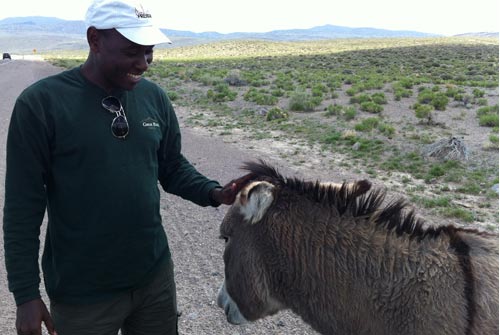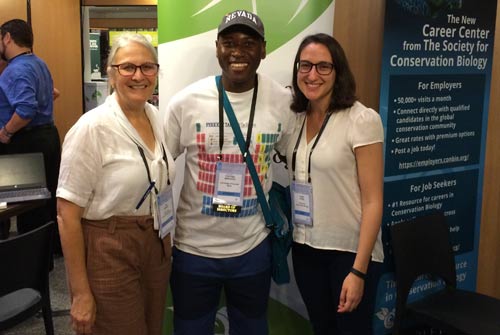Israel Borokini is currently completing his PhD research on a federally-listed and rare and endemic plant species, Ivesia webberi at the University of Nevada, Reno. Originally from Nigeria, Borokini is the information officer for the SCB Africa Section and has spearheaded membership drives and new SCB Chapters in Africa. SCB asked Israel about his work and the conservation community.
Tell us about your research.
My research interests are on conservation genetics and population biology of threatened and rare plants in West Tropical Africa and North American desert ecosystems; as well as biogeographical principles governing species distribution and ecological niche occupation and conservatism, with regards to native and invasive species. I am currently working on my PhD research which focuses on a federally-listed threatened, rare and endemic plant species, Ivesia webberi. I am investigating its population structure and genetic diversity using sequences generated from single nucleotide polymorphisms (SNPs) molecular primers, using next-generation sequencing (NGS) methods. Furthermore, I am hoping to model the distribution of this species using boosted regression trees (BRT) and other algorithms packaged in BIOMOD. Knowledge from this research will be pivotal to the development of conservation action plan for this species, for effective management of the species and sustainable use of public lands.
How did you become interested in conservation?
I grew up within a forest reserve where my dad worked for a federal government research institute in Nigeria. Therefore, I was highly connected with nature throughout my formative years, drawing inspiration from it, hiking inside it, collecting wild fruits, playing with friends in the forest, and going to bed with monkey chatters and wild dog barking and waking up to melodious bird chirping. My passion for the wild never dissipated as I grew up, so it became a natural thing for me to pursue a field in nature conservation.
|
|
When did you first become a member of SCB and how are you involved?
I was introduced to SCB by a good friend and research colleague, Dr. Fola Babalola in 2009. However, I became more engaged in SCB activities in 2014, and helped in the formation of the Nigerian SCB chapter. Furthermore, I got elected to the Board of Directors for the Africa Section as the Information Officer. I also attended the ICCB in Montpellier, France and helped coordinated the Section business meeting during the Congress. During the business meeting, I encouraged the formation of more chapters in Africa Section, which has become successful with one chapter formed in Ghana and others being planned in South Africa, Kenya and Madagascar. I was also part of the mentors that helped African peers through the Section’s E-mentoring program.
Where would you like to see SCB in ten years?
I will like to see more impact of SCB at the grassroots, through individual members’ giant strides and achievements, and chapter initiatives and pragmatic contribution to societal issues that affect biodiversity conservation. It is interesting that some of the world’s most biologically rich countries are faced with limited academic and intellectual capacity in conservation management and research. Therefore, I hope to see SCB facilitate capacity building on conservation issues among these countries. Furthermore, I am hoping that SCB membership would have increased geometrically and expanded to include corporate memberships, all of who will be contributing significantly to the preservation of the world’s beautiful nature! I dream of a future when SCB will play colossal consultative role in global biodiversity conservation policy formulation and become significant think-tank in the management of global bioresources.
What are some obstacles you've encountered in your career and how did you overcome them?
Coming from a developing country, access to technical information in conservation science was very challenging and that was why I decided to make sure my PhD program will be done outside the region so as to boost my academic and research capacity. Funding was a huge challenge for me in the several research studies I have carried out, and in most cases, I have had to finance my academic and independent research with my personal funds. Professional membership of organizations like SCB was high instrumental in solving some of my obstacles, through exposures to funding and academic opportunities.
|
Left to Right: SCB Executive Director Geri Unger, Israel Borokini, and SCB Operations Manager Lauren Krizel at ICCB 2015. |
What is your advice to young conservationists?
Young conservationists are likely to have similar challenges of funds and access to academic materials that will help guide them in their studies and practice. Therefore, my first advice for them is to join SCB. By doing this they can have access to some relevant academic journal articles, and network with peers and seniors in the field from whom they can draw inspiration and exchange ideas. Secondly, if you have graduated from tertiary institutions and have no job, engage yourself by volunteering your time at any conservation institution near you. It keeps you busy, you gain relevant experience and such professional volunteering looks great on your CV or resume. Collaboration! Even today, many large companies and corporations are synergizing, therefore, look for like-minded peers and seniors to collaboratively work with. Never stop learning! If you have a BSc, aim higher for graduate degrees or some enriching professional courses. Finally, I will encourage you to have dogged determination, keep that passion burning in you and surround yourself with people who appreciate you and what you do. When you face life challenges in your career, these elements will sustain you.
Would you like to add anything else?
I have a MSc in Botany from the University of Ibadan, Nigeria and work as Principal Scientific Officer at National Centre for Genetic Resources and Biotechnology, Ibadan, Nigeria. I am currently doing my PhD research at University of Nevada, Reno. Within about six years of active research and conservation practice, I have written two books, coedited one scientific conference proceeding, published 56 articles in international journals, and assessed two species for IUCN red list of threatened species, in addition to about 30 scientific conference presentations. Most of my research focused on plant ecology, taxonomy, ethnobotany and conservation in the Guinean forests of West Africa. I volunteered 12 months of conservation management and environmental education in Reno, Nevada prior to commencement of my PhD program. I also currently volunteer for IUCN in the assessment of tropical African plants for IUCN red list of threatened species.

